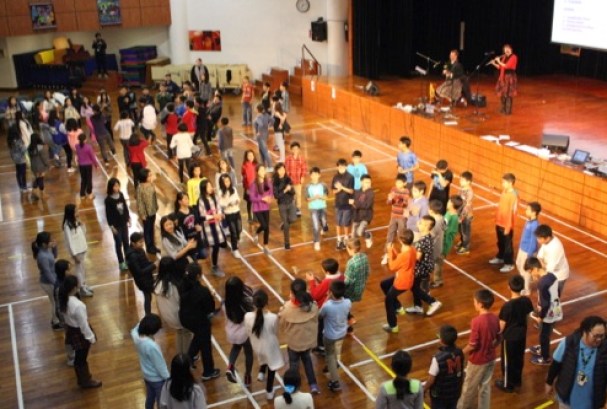
Spinning and dancing with a group of primary six (P6) students in Gaelic music, it would be easy to think you’re in Scotland when you’re actually in the hall of the Macau Anglican College (MAC), taking part in the Ceilidh Night on Friday.
“Originally the word Ceilidh descended from the Gaelic word for ‘gathering’ or ‘party’. It could be anything, incorporating singing, dancing, stories and poetry. However, these days when people think of a Ceilidh they think of a fun filled night of dancing and music. In Scotland they are a popular choice for weddings and other social gatherings. Most people do not know the dances anymore however, so a ‘caller’ is usually provided to guide people through the dances and make sure everyone participates,” MAC explained to the Times.
After a week of learning and practicing, the P6 Ceilidh Night was an opportunity for MAC’s P6 students to share with the school community what they had acquired from a weeklong workshop prepared by several Scottish teachers. Both primary 5 and primary 6 students in MAC have joined the workshops, taking place between January 5 and 16. The workshops, co-sponsored by MAC and the Macau Foundation, were run by two professional musicians and experienced workshop leaders, Kate Badcock and Roddy Johnston from Scotland, and were organized by Fearon Education (Macao). During the workshops, the instructors integrated the learning of geography, history, literature and culture into the music and dancing.
Around a hundred MAC students, teachers and parents joined the Ceilidh Night on Friday. The students sung several folk songs and took part in the folk dancing. They also invited their parents, teachers and their principal to participate in two dances.
After the event, the Times spoke to Kate Badcock and Roddy Johnston. They said that, around a year ago, they received the invitation to share their music and dancing with the MAC children and to be able to teach the students a new culture.
They have worked with both the primary five and six students and said that they have enjoyed the experience. “What we want is to put the music and dancing in some sort of cultural context. We give the children songs to sing and dances to dance. So we try to put a bit of history and a bit of singing into it… We actually talked quite a lot about what life was like when the songs were written. [We also] talked about work: what works there were and what industries there were in Scotland,” said Ms Badcock.
“The reaction has been great from the children. It’s been very humbling to see that they picked up the songs. We have been doing songs in English but also songs that have been partially in the Scots language as well. The [students] went with it. They picked up the words and I think they enjoyed it,” said Mr Johnston.
Moreover, the two musicians reflected that the students were very engaged in learning facts about Scotland and many discussions on issues related to the region were organized.
They also said that they noticed an interesting fact in that Scottish and Chinese music share some similarities in terms of their melodic structure. In fact, when they played a piece of Scottish music to the students as a tone and did not tell them what song it was, they said that at least half of the students were convinced that it was the tune of Chinese music. Badcock said that it is because both Scottish and Chinese music use the pentatonic musical scale.
In terms of the conception of the project, the Times also spoke to Zhang Lijia from Fearon Eduction. Being a former staff member of the school, Ms Zhang said that MAC has the reputation of bringing interesting and unique projects to its students. “I know quite a few people in Europe doing music and I know they are very experienced in running these kinds of workshops in England. And I think something like this can happen in Macau as well. I also know that the Macau government is trying to bring in different kinds of workshops into schools, so I thought this would be a good idea,” she said. “It’s just to diversify the kind of education experience Macau students have… It could be a growing thing in Macau too.”
From her observation, she believes that the MAC students have really enjoyed their time spent engaging in something they feel relaxed about. “In the discussion time when they explained the history [of Scotland], there were a lot of kids asking questions. I was surprised by some of the kids asking sophisticated questions, especially on the topic of war,” she said.
Furthermore, Ms Zhang believes that the workshop is an experience that can also be brought to other local schools so that students can have an intercultural experience. She also thinks that children can benefit from learning in a way that they enjoy, which is what she saw in the Ceilidh workshops in MAC. “Personally, I would love to see more of that in Macau,” she said.
Ceilidh Night School fosters traditional Scottish music and dance
Categories
Macau














No Comments